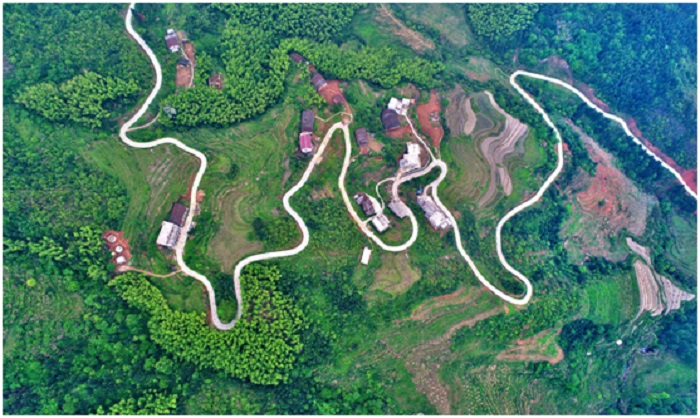



The Chinese people always say “better roads lead to better life.” Therefore, transportation infrastructure must be built in advance to carry out poverty alleviation.
In the recent years, China’s rural transportation has experienced drastic changes, which both facilitated rural residents, and revitalized rural development.
Five poverty alleviation cadres and representatives recently shared their stories of fighting poverty through the improvement of transportation infrastructure with People’s Daily.
Xu Wenqiang, director of the Tibet Autonomous Region’s transportation department introduced that the total transport fixed-asset investment of the autonomous region is expected to exceed 251.5 billion yuan ($36.23 billion) at the end of this year. The total mileage of Tibet’s expressways was only 38 kilometers five years ago, but has now added up to 620 kilometers and will reach 1,100 kilometers based on the completion of the projects implemented between 2016 and 2020. As of the end of the last year, the total mileage of highways in the autonomous region reached 104,500 kilometers.
“Before the end of this year, all townships and incorporated villages that meet the conditions will be connected to highways, and 95 percent of townships and 75 percent of incorporated villages will be connected to hardened roads. Tourists visiting Tibet and local residents will be able to enjoy safer, more smooth and more convenient trips,” he said.
Anyuan in the southwestern part of Jiangxi Province, was considered a remote county before 2013, as it cost a day to travel from it to Ganzhou, a city just 200 kilometers away. In the recent years, a vast expressway network connected with neighboring provinces has been built, introduced Luo Hongbo, an official with the department of policy and legislation under the Ministry of Transport and deputy Party secretary in Anyuan county.
He said drastic changes have taken place in Anyuan. Enterprises have invested in the county, which solved the employment problem of the local young people; the low logistics cost facilitated e-commerce and tourism. A total of 2 billion yuan of turnover was achieved last year by the county’s e-commerce businesses, and over 80 percent of townships and 32 percent of impoverished villagers are fighting poverty through e-commerce, Luo said. More than a third of the townships in the county developed tourism, receiving 4.8 million tourists last year, he added.
Sertar county in the Tibetan autonomous prefecture of Garze, Sichuan Province was once in deep poverty. With an average elevation of over 4,127 meters, the mountainous county was isolated. Gui Zhijing, deputy Party secretary of Sertar county experienced the transportation progress there. “After four years of poverty alleviation efforts, the county now has 2,260 kilometers of highways, and 17 townships and 134 incorporated villages have been connected to hardened roads and bus services. The county officially got rid of poverty in February,” Gui said.
Last year, Sertar county attracted an investment of 130 billion yuan, and the number of hotels in the county rose from 54 to 150. Gui believes that the better transportation will bring better lives to the local people.
“The continuously improving transportation has laid a solid foundation for industrial development,” said Lyu Yida, who was once the first Party secretary in Rela village, Aba Tibetan and Qiang autonomous prefecture, Sichuan Province. According to him, Rela villagers suffered severe road conditions in the past, until a 6.9-kilometer road network was constructed. The village was connected to hardened roads and bus services.
“The village established a food company in 2018 that sells yak meat and honey. The company achieved revenue of 2.6 million yuan last year, which largely reinforced the confidence of the villagers in poverty alleviation,” Lyu introduced.
Wang Guangguo is the Party secretary of Dianziping village, Jianshi county, Enshi Tujia and Miao autonomous prefecture, Hubei province. According to him, it usually took a couple of hours for the villagers to go to a fair in its neighboring township, and they had to walk along the cliffs. Thanks to the poverty alleviation efforts, the village has constantly improved its transportation, from building gravel roads to asphalt roads, connecting every household with hardened roads.
“We used to grow only potatoes, corns and soybeans, but now we started growing fruits and established a chili factory that sells our products overseas. The new roads help drive industrial development and bring wealth to the people,” Wang said.


The Humanitarian Service Diamond Awards has.
A Chinese Company, Inner Galaxy Steel.


The Programme Coordinator, Regulatory, Compliance and.


A Non-Governmental Organization (NGO), Committee for.
The Trustfund Pensions Limited has chided.


The House of Representatives Committee on.
The China General Chamber of Commerce.


Senator Chuka Utazi who represented Enugu.


An Abuja based Legal Practitioner, Ugochukwu.


The African business community in Yiwu,.
Leave a Comment